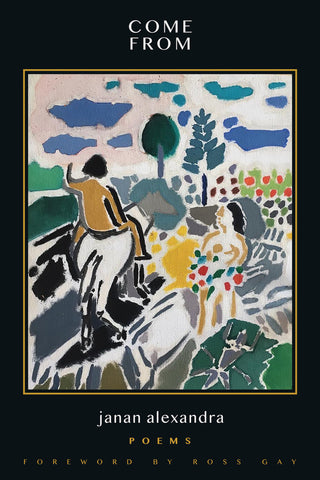
About This Title
Here is a collection that pulses with warmth and vitality, heralding the arrival of a fresh and vibrant voice on the poetry scene. Clear and concise, accessible and profound, janan alexandra’s debut poetry collection come from weaves from English to Arabic, exploring the joint projects of longing and belonging.
Part love song for the speaker’s mother and part grief song for ongoing postcolonial loss, this book reaches for, around, and through language—feeling for its limits and possibilities. come from searches for what might be possible if we dislodge our practices of belonging, divest from nation and state, and instead turn deeply toward each other.
Drawing on both narrative and lyric impulses, alexandra invites readers into a world bristling with family, memory, home, and inheritance—all in the wake of dislocation and fracture. In one section of the book, we follow the speaker “back home” after years of separation; later, we encounter a series of parables in the form of an Arabic abecedarian, through which the speaker recovers parts of her mother tongue—invoking personal and communal histories marked with the longue durée of empire.
come from investigates what is deeply interior while reaching toward the world with tenderness and generous attention.
Praise for come from,
“Here, janan alexandra makes audible something ancient about poetry, that it courses through our anatomies, through the larynx and out the mouth: ‘girl makes / her tongue a slab of meat / between rows of teeth. / th!, th!, th! : / sound of feet / slicing through snow.’ Listen to the smallest gestures of the hand on paper: in the orthography of an aleph is an animate world wound with centuries of violence and wonderment.” —Carolina Ebeid, author of Dauerwunder, a brief record of facts
“come from arrives, it seems to me, in the footsteps of the cats, of the great Etel Adnan, of the worn & sun-hot stone. Wisdom. Vision. What a dream to find this sound, to reach & reach again for janan alexandra’s brilliant, steadfast attention – each phrase an altar of life, a route to past-language. Question, exclamation, sorrow, memory. I am more alive to read this poet’s every light & dark.” —aracelis girmay, author of the black maria
“Quietly gorgeous, these poems awaken me. The alive of the language: ‘the wind sweeps my head, suddens my wonder’ ('Ars Poetica,' a perfect gem of an unrhymed sonnet). This is a book of tenderness and generosity. You may not know it, but you need ‘Affirmation.’ And right now we all need 'Come From' and 'Arab American Syntax'—and to consider 'When there’s no ceiling left, how do we assemble the sentence?'” —Ellen Doré Watson, author of pray me stay eager
"If I were lucky enough to introduce you to janan alexandra’s marvelous first book, come from, by which I really mean if I were to tell you about it what I love...I might start with feeling, how the poems themselves feel yes—recklessly, holleringly, precisely—but also how much in the poems there is to feel, to touch; how thick with the palpable world, how in it they are, and of it, how rich with land and people, with elderberries and ankles and eyes and ferns and saplings and oarlocks and cornflowers and hands and throats and tongues and the plush ears of donkeys and the dreams of bats...I cannot explain it, but the poems, not only their sorrow, but their glee and their wonder and their tumult and their goddamn too, they somehow open their arms to us and bring us in, they set a place and say you can be here, you can rest here, right where you can hear the birds singing, the loves, the roots reaching as they are through the dark, toward us, always, I love these poems how they make welcome.” —Ross Gay, from the Foreword
Excerpt from come from,
Come From
if we do not speak
in the night in the kitchen
here leaning over the starry counter
like two hunched sunflowers
if we do not stand stooped
like this picking at cold lasagna
which is neither the food
of your country nor my own
how will we carry this tin pail
sloshing with the question
can you imagine walking
into a softly lit room
in the world & feeling
hereiam, homewithallofyou?
to be known in the arithmetic
of belonging we follow
an order of operations
we do the math
enough & not enough.
what are you really really?
from from?
really we are the field
in each other’s eyes
we hope to die surrounded
by our own languages—
even those we cannot speak

